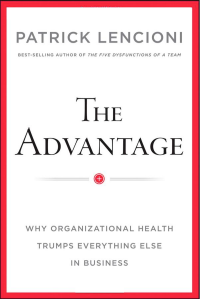The Advantage – A Book Review
The Advantage – A Book Review
“The single greatest advantage any company can achieve is organizational health. Yet it is ignored by most leaders even though it is simple, free, and available to anyone who wants it.”
~ Patrick Lencioni, The Advantage
I don’t usually indulge in book reviews as blog posts (for which check out my Goodreads page), but the new book from Patrick Lencioni has prompted me to make an exception.
Not that I think it’s a great, must-read book. Far from it. But because its topic – organisational health – is sufficiently close to my core focus (organisational psychotherapy), I’ve decided it’s worth mentioning by way of this review.
“After two decades of working with CEOs and their teams of senior executives, I’ve become absolutely convinced that the seminal difference between successful companies and mediocre or unsuccessful ones has little, if anything, to do with what they know or how smart they are; it has everything to do with how healthy they are.”
~ Patrick Lencioni, The Advantage
Lencioni
For those unfamiliar with Patrick Lencioni and his works, he has written a number of great (IMO) books including:
- The Four Obsessions of an Extraordinary Executive ★★★★★
- The Five Dysfunctions of a Team ★★★★★
- The Five Temptations of A CEO ★★★☆☆
- Getting Naked ★★★☆☆
- The Three SIgns of A Miserable Job ★★★☆☆
- Death By Meeting ★★★★★
- Silos, Politics and Turf Wars ★★★★☆
Each of these, in their own way, has been great reading; informative, thought-provoking and grounded in Lencioni’s 20+ years of consulting practice. Each has been a notable influence in my own practice.
The Advantage
Simply put, I found this book a disappointment. I guess this is because it’s mainly a rehash of much of his other work. I had been hoping, from the free sample, to find a book centred on the issues of organisational health. But apart from the first chapter, there’s nothing much here about organisational health per se at all. It’s as if the author has suddenly found a smart label to stick on his collective works, and tied a whole bunch of stuff together under one umbrella. Kudos for the marketing chops, at least.
His continual emphasis on the role of leaders and leadership also grates with me. For the majority of organisations – i.e. those of the Analytic mindset – I’d agree that leaders (senior execs in particular) set the tone and model the behaviours that the rest of the organisation tends to follow. But doing the wrong thing righter is, I posit, not anywhere near as useful as doing the right thing – for which I offer fellowship as a prime candidate. Ironically, then, it seems to me that an organisation that emphasises the hegemony of leaders (and the relative diminution of the role of others) is likely less healthy than it might be.
These things being said, you might like to read this book if you haven’t read much or any of his other works before. The Advantage offers a convenient entry point into his collective works, with sufficient references into his other books for following up on details and specifics.
The Advantage is also a departure from the author’s more usual business novel (a.k.a. ‘Fable’) format. So if you shy away from business novels, then this more prosaic, text-book approach might appeal to you. ★★☆☆☆
– Bob
P.S. For the Rightshifters amongst you, I suggest that the author’s enthusiasm for organisational heath, and the benefits he attributes to it, correspond fairly closely to an organisation’s relative position on the horizontal (rightshifting) axis (i.e. the healthier an organisation, the more effective it is). More specifically, I’d say that organisational health corresponds more or less to the green (fun) line on this ‘Perspective on Rightshifting’ chart.
Further Reading
Flourish ~ Prof. Martin Seligman See also: PERMA and the Positive Business
Table Group website page for The Advantage


Thx for this book tip. I put in right on my reading list – entry #217 🙂
But seriously: I like the idea of organizational health. But what is health (German: Gesundheit)?
The other day I was at the dentist and he said to me: “We see you more holistically. We´re trying to increase your ability to compensate.” (German: Kompensationsfähigkeit, English: compensationability? 😉
That struck a chord in me. Yes, I guess to be healthy means to be able to compensate all sorts of deviations from some mean. A body (or any product) is build to “function” in a certain kind of environment. It´s exposed to lots of influences, e.g. temperature, pressure, food etc. They may be physical, chemical or psychological.
The wider the range of influence variations a body/product (or organization for that matter) can cope with, the healthier it is. I think, this is also in line with resilience research on traumatized people.
So when assessing an organization the question is: How strong is its ability to compensate? Can it cope with 10% more support calls? Can it cope with 20% less revenue? Can it cope with 15% more fluctuation in staff? Can it cope with 5% more feature requests? Can it cope with a shortened technology cycle? Can it cope with 20% more competition?
My impression is, the ability to compensate in general is very low. People are working long hours (very ineffectively). There is not much money in the background. Costs have been cut to the bare metal. Ability to innovate is low. No time for learning.
But this all would nicely fit under the umbrella of “ability to compensate”, I guess, as a measure for health.